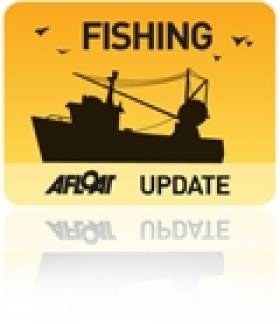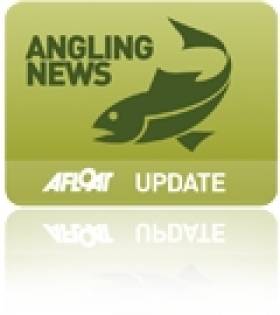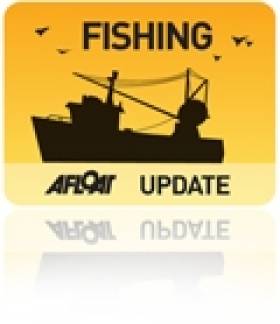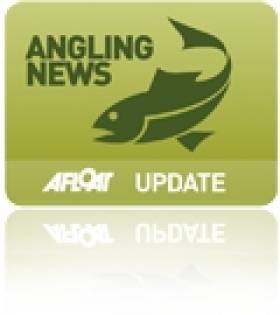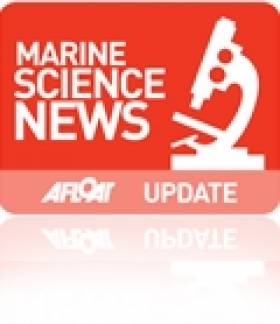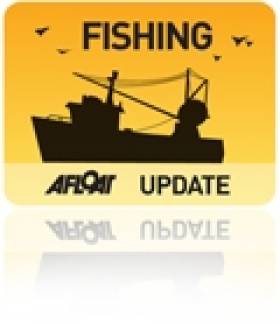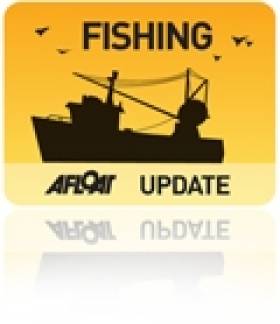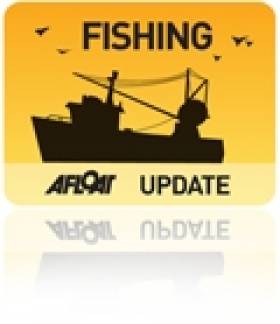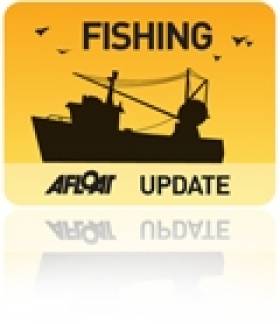Displaying items by tag: fisheries
Marine Escapes Cuts in Latest Budget
#BUDGET - Coastguard and lifeboat services, mountain rescue and the Commissioners of Irish Lights will not face any further funding cuts in the latest Budget, according to the Minister for Transport.
The Irish Times reports that, following the reduction of his department's budget, Minister Leo Varakdar stated that substantial cuts have already occurred in the maritime safety sector.
Moreover, he announced an increase in the maritime budget from €70.5 million to €80.3 million, due to provisions for the new Irish Coast Guard helicopter contract.
Earlier this week, Minister for Agriculture, Food and the Marine, Simon Coveney, underlined the importance of the marine sector to Ireland's coastal communities.
As previously reported on Afloat.ie, Minister Coveney announced a round of expenditure estimates on Monday which include increased funding for investment in processing, aquaculture and fishery harbours.
Coveney Aims to Ensure fish Stocks 'Not Compromised'
The Programme for Government provides that a Sea Fisheries Sustainability Impact Assessment, based on consultations with stakeholders will be brought before the Dáil annually before EU fisheries negotiations commence. Minister Coveney said "As soon as the EU Commission brought forward its proposals for 2012 TACs and quotas, I initiated a consultation process and asked stakeholders to provide their comments on the proposals. I also arranged a meeting with representatives of stakeholders to assist and inform consideration of the proposals. I have now received the views of the fishing industry and also of environmental interests which I have carefully considered. I presented to the Dáil today a formal assessment which takes account of these views and also the expert contributions from the Marine Institute and BIM".
The Sustainability Impact Statement reviews all the stocks of importance to Ireland taking account of the scientific advice on the stocks. The statement also sets down the economic importance of stocks and the likely impacts from a socio-economic perspective. Minister Coveney said "It is very clear from the analysis undertaken by BIM that the current proposals could have significant consequences on our fishing industry and our dependant coastal communities. Potentially there is a loss of €16m for the fleet operating in the Celtic Sea, a loss of €5.3m for the fleet in the Irish Sea and €1.2m loss in the north-west. This equates to losses in the order of €60 to €65m for coastal communities where the direct cost and indirect costs (processing, net making etc) are taken into account".
Minister Coveney added "We must ensure that the state of fish stocks is not compromised and the scientific advice provided informs decisions on TACs and quotas for 2012. However, this can not mean that a simplistic approach is taken and automatic cuts are applied where full analysis of the stock in not available. We need to make use of all available data in setting next year's quotas so that decisions made are informed and appropriate".
In tandem with the Dáil debate the Marine Institute presented the Minister with 'The Stock Book' produced annually by the Marine Institute (MI). The Stock Book gives the latest scientific advice on the state of those fish stocks that are exploited by the Irish fleet and managed under the Common Fisheries Policy (CFP). Minister Coveney said "The Stock Book is an important element in determining Ireland's position on stocks in advance of negotiations on fishing opportunities at the December Council. I am a keen advocate of fully informed decision making and the information contained in the Stock book is of vital importance in forming our position at the hard negotiations in December".
First Meeting of National Inland Fisheries Forum
Seasonality, climate change and the environment were the hot topics discussed at the inaugural meeting of the National Inland Fisheries Forum in Athlone last Thursday.
Inland Fisheries Ireland chief executive Dr Ciaran Byrne hosted the forum, whose 60 voluntary members - drawn from various stakeholder groups - are is set to meet twice annually.
The day saw TV personality and keen angler Derek Davis installed as chairman of the forum, following his appointment by the Minister for Natural Resources.
Davis noted that the forum "can influence policies for the protection, management, development and conservation of this valuable resource now and for the generations to come."
In his own address to the forum, Dr Ciaran Byrne highlighted the members' collective experience in fisheries management on Ireland's inland waterways.
“A number of you have served as members of the central and regional fisheries boards, some for over 20 years," he said. "As members of the forum you have the opportunity to discuss and advise on the future of inland fisheries in Ireland. IFI looks forward to receiving your considered views on the various issues.”
In a message to the meeting, Minister Pat Rabbitte stated his belief "that the forum will provide a meaningful channel of communication between the stakeholders and management of the inland fisheries resource".
Wild Salmon Showing Signs of Adapting to Climate Change
New evidence is indicating that wild salmon are adapting to climate change by feeding in colder waters, The Irish Times reports.
According to salmon expert Dr Ken Whelan, wild salmon are now diving as far as 800m below the surface - normally the preserve of the sperm whale - to feed for periods of up to 24 hours during winter months.
They are also travelling closer to the polar ice fields, in response to the warming of the Atlantic Ocean.
The change in behaviour was noted at a salmon summit in France attended by more than 100 fishery managers and scientists from across Europe, which was convened to discuss the threat of climate change to wild salmon stocks at sea.
Plankton levels are particularly affected by the changing wind and ocean currents, said Dr Whelan of findings from the EU-funded Salsea programme, which he led.
“Surviving the first winter at sea seems to be the key challenge for these stocks, and the salmon in the northern states like Norway and Russia, seems to be less affected,” he said.
But the recent return of wild salmon to the Tolka in Dublin, as well as healthy numbers along other inland waterways, highlighted that the news was not all doom and gloom.
The Irish Times has more on the story HERE.
Notice of Angling Reservoir Closures in Northern Ireland
Northern Ireland Water has announced that some of its reservoirs will be closed to angling temporarily from next January to facilitate refurbishment work.
The water levels on the reservoirs in the DCAL Public Angling Estate work be lowered on a phased basis from next year by Northern Ireland Water.
Ahead of that work, fisheries staff will be reducing fish stocks in the interest of welfare.
The fisheries will be closed from the start date of the works until the refurbishment work is completed, water levels restored and stocking re-commenced stocking, which could take up to a year.
Anglers will be notified of the details of the temporary closures of Public Angling Estate waters on the Department’s website
Full details will be available online for anglers at www.nidirect.gov.uk/angling.
Closure dates (subject to change) are listed below:
Portavoe - January 2012
Copeland - January 2012
Lough Mourne - April 2012
Lower South Woodburn - November 2012
Middle South Woodburn - March 2013
Upper South Woodburn - August 2013
North Woodburn - January 2014
New Marine Atlas Answers Important Questions
This second edition of the Atlas of the North Western Waters is now available for free download here. It has been funded under the EU MEFEPO (Making the European Fisheries Ecosystem Plan Operational) project, made up of ecologists, economists, management experts and fisheries scientists who are trying to make ecosystem-based fisheries management (EBFM) a reality in Europe. EBFM seeks to support the 'three pillars of sustainability' (ecological, social and economic) and as such includes human activity in the ecosystem.
The Atlas is intended for policy makers, managers and interested stakeholders. Its purpose is to provide a broad overview of the ecosystem of the NWW Regional Advisory Council (RAC) area with the science kept as clear and concise as possible and technical language kept to a minimum.
"Next year the European Marine Strategy Framework Directive requires an analysis of the features, pressures and impacts on member states' waters and the reform of the Common Fisheries Policy will put more emphasis on regionalising management," said Dr. Cormac Nolan of the MEFEPO project at the Marine Institute, "so this new edition of the North Western Waters Atlas, and the work of the MEFEPO team behind it, is both timely and valuable."
The first edition of the Atlas, published in 2009, was extremely well received and this 2nd edition has been updated and revised in response to stakeholder feedback. The Atlas provides up-to-date information on the physical and chemical features, habitat types, biological features, birds, mammals, fishing activity and other human activities taking place within the NWW region. There are new chapters on elasmobranchs and mariculture and the hot topic of discarding is covered in more detail. Background material on four NWW fisheries (mackerel, hake, Nephrops and scallop), which have been used as case studies in the MEFEPO project, is also presented.
Coveney Welcomes Seafood Exports Boost
Minister Coveney thanked Bord Bia, who organised the Irish participation, for their successful efforts over the year which saw seafood exports increase in 2010 by 18% to €365m. The Minister said that "Irish Seafood exporters are indigenous businesses with significant scope for expansion who have an important role to play on the road to National economic recovery".
The Minister added that "it is very encouraging that our seafood exports increased by 18% last year. Over 70% of our Seafood exports are sold in EU Markets and hence it is important to see such a strong representation from the Irish Seafood Exporters here at this trade expo, the major annual seafood trade event within Europe. There are more exhibitors this year than in 2010. The Irish seafood sector has exciting potential for further development on the domestic and international markets. If we want to continue towards a high margin export strategy we need to co-operate with each other, continue to differentiate, innovate and develop products based on customer feedback and market research".
On Ireland's international reputation for wholesome, fresh and natural seafood, produced in a sustainable and environmentally friendly manner, the Minister said "this is a key selling point for Irish seafood companies and together with Bord Bia's marketing expertise, and the co-operation and determination of our seafood industry I am confident that we will have a more vibrant and successful sector in the years to come".
The Minister also used the opportunity of his visit to Brussels to meet with the European Commissioner for Research, Innovation and Science, Maire Geoghegan- Quinn. The Minister said "I see the Commissioner as an important ally for Ireland in the Commission and in Europe. I am anxious to develop a strong working relationship with her".
The Commissioner's directorate is responsible for the €142 billion budget of the new Common Strategic Framework 2014-2020 (CSF) Programme, which will combine the funding of a number of current competitive research programmes into a single strategic research vehicle. The Minister went on to say that from an Irish perspective "it is vital that the expertise, previous championing and contribution to the development of research based policy formulation in Europe materialises itself into being successful in the tendering processes in new research programmes. I outlined some of the work of the Marine Institute on the EU front in recent times and the opportunities that it and other Irish research bodies can realise using the expertise and experience built up. I also used the occasion to brief Commissioner Geoghegan-Quinn on the major policy challenges we are facing in agriculture and fisheries, particularly the reforms of the Common Agricultural Policy(CAP) and the Common Fisheries Policy (CFP). The Minister outlined his strong concerns relating to the proposed EU Mercosur Trade Agreement and its impact on the agri food sector in Ireland".
Minister Coveney sought the meeting with the Commissioner to discuss the planned reform of the Common Fisheries Policy (CFP) and other topical issues on the fisheries horizon at present. Minister Coveney invited Commissioner Damanaki to Ireland to meet the Irish Fishing industry in coastal communities.
Minister Coveney said "It is important from the perspective of furthering Irish ambitions that I build up a close working relationship with the Commissioner, so I saw this as an important opportunity to develop a rapport and connect in a meaningful way with Commissioner Damanaki. I had a frank and forthright discussion with her on the Reform of the CFP, and on Ireland's priorities."
The Minister set out key priority issues for Ireland in the CFP reform. A major priority is the retention of the Hague Preferences, agreed by Heads of State in 1976 by way of the Hague Resolution, under which Ireland receives additional shares of quotas for the whitefish stocks around our coast. There was been strong pressure from certain Member States that these should be abolished in the Reform. Minister Coveney said "Any interference that results in Ireland losing the current benefits of the Hague Preferences within the reformed CFP would be totally unacceptable to me. The Hague Preferences were the payment made for Ireland granting access to our waters to other Member States and a recognition of the high costs involved for the State in the control of these rich fishing grounds."
Minister Coveney set out Ireland's opposition to the mandatory privatisation of fish quotas and outlined the impacts of this policy on Ireland's coastal communities dependant on fisheries. Minister Coveney said "I used this the opportunity to explain why Ireland is strongly opposing a mandatory scheme for privatisation and trading of fish quota. I explained that the family owned fishing fleet in Ireland would be quickly bought out by international fishing companies without links to the coastal communities. I explained my strong belief that these companies would not land into Ireland and we would lose not just the jobs in the fleet but also the processing and ancillary jobs in our fishing ports."
Commissioner Damanaki has placed discarding of fish high on her agenda for the CFP reform to which the Minister made clear that he was committed to giving Ireland's support to assisting the Commissioner in identifying and implementing the appropriate measures to effectively address discards.
In addition to the issues surrounding the CFP reform, the Minister made very clear Ireland's demand for strong actions against Iceland and the Faroe Islands for their irresponsible and untenable fishing activities on the mackerel stock. The Minister said "the actions of these two fishing nations pose a serious threat to the well being of the mackerel stock which is very important to Ireland. I pressed the Commissioner to initiate strong action now, including the introduction of trade sanctions to bring pressure to bear on these two parties to come to the table with reasonable demands and agree a long term management framework for mackerel".
Finally the Minister said "I will continue to liaise closely with the Federation of Irish Fishermen and other industry representatives to further develop Ireland's negotiating position. I consider that today's meeting with Commissioner Damanaki was very useful in giving her a full understanding of Ireland's situation and the importance of the maintenance of a strong fishing industry supporting the fishing communities around our coast".
Illegal Fishing Won't Slip Through the Net
"Traceability is central to these new rules, 'from net to plate'. It will enable Member states to spot wrongdoings along the market chain, and trace them back to the culprit. Inspections will be carried out in the same way all over Europe. Data will be collected and cross-checked electronically. So once the product reaches the stores, the consumer will know it has been fished legally.
Mr Higgins, who is a member of the European Parliament's Committee on Fisheries, says those involved in illegal practices like overfishing will be punished. "If someone breaks the law, they will face equally severe sanctions wherever they are and whatever their nationality. If they are caught fishing illegally repeatedly, thanks to a new point system they will end up losing their licence."
The Fine Gael MEP added that the EU now has the means to establish a real culture of compliance against overfishing to ensure a sustainable fisheries sector in Europe.
Coveney to Focus on Future of Coastal Communities
The meeting focused on the key areas of importance to both countries in the Common Fisheries Policy. Minister Coveney said "I consider that the Reform of the CFP to be absolutely crucial to the future of the Irish fishing industry and I am committed to working to deliver a reform package that works for Irish fishermen and also ensures that fish stocks are rebuilt and are managed in a sustainable way. Coastal communities are directly dependent on a healthy fishing industry and the new CFP must deliver long term economic activity and employment for these communities. My experience to date in public life has reinforced the importance of building trust and a positive relationship with key decision makers. My relationship with the Spanish Minister with responsibility for fisheries is important in that regard. Today was an important first step in that relationship".
Minister Coveney and Minister Rosa Aguilar agreed to focus on key elements of the CFP Reform and to develop a mutual understanding in advance of key negotiations later this year. A joint statement on the areas of mutual interest that were discussed is attached. Minister Coveney said "While there are certain areas where Ireland and Spain have opposing positions, particularly in relation to access to fish stocks, there are many areas where both countries have similar concerns. Both countries have coastal communities very dependent on fishing and related activities and the new CFP must be reformed to work positively in the long term to support these communities".
Minister Coveney added "The development of mutual understanding on core issues including effectively addressing discards, will be critical in the negotiations. I am also convinced that the consumer must be given clear information on the origin and production methods of fish in order to be able to make an informed choice. This approach will, I firmly believe, benefit EU fishermen and aquaculture operators who operate under strict environmental and food safety rules. I am seeking to reform the CFP in the area of governance so that stakeholders are given a key input into management arrangements that are developed on a regional basis. Both Minister Rosa Aguilar and myself are convinced of the importance of increased EU funding to support the reformed CFP.
I will be consulting closely with the Irish fishing industry and other stakeholders over the coming weeks so that I have a full understanding of all the issues. We have the opportunity now to deliver real reforms and I consider that we must work closely with other Member States on areas of mutual interest and importance to develop a policy that ensures that there is a future for Irish fishermen and coastal communities".



























